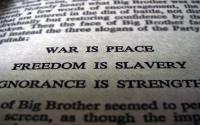Author's Note: I've been working around the clock on my new book, "Fanatics, Fools and Alpha Males," which will be published in March by Miramax Books. In the spirit of the season, I'm sending you a succulent slice from the book. It's a collection of resignation letters written by disaffected members of the Bush administration who so disagreed with administration policies that they preferred the uncertainty of the unemployment line to toeing the party line.
I've also taken the liberty of including excerpts from what I imagine the first drafts of these letters might have looked like.
So thanks to these unsung heroes.
Mike Dombeck, Forest Service chief, resigned March 27, 2001, after four years on the job.
What he wrote in his resignation letter: "It was made clear in no uncertain terms that the administration wants to take the Forest Service in another direction ..."
What Mike Dombeck wrote in the first draft of his resignation letter: "It was made clear in no uncertain terms that the administration needs to kiss a little logging-industry ass, having gotten nearly $300,000 in donations during the 2000 election (10 times more than Al Gore). Mr. President, after all that bark-bussing and timber-tonguing, it's a wonder you didn't get splinters in your lip or a very painful STD (Sequoia Transmitted Disease).
Fact: Before the U.S. Forest Service approves a timber sale on federal land, loggers are currently required to study the impact on endangered animals and salmon runs. The Bush White House is pushing to overturn both of these requirements.
John Brown, Ph.D., was a Foreign Service officer for nearly 25 years, having served in London, Prague, Krakow, Kiev and Belgrade. He resigned March 10, 2003.
What he wrote in his resignation letter: "I cannot in good conscience support President Bush's war plans against Iraq. The president has failed to: explain clearly why our brave men and women in uniform should be ready to sacrifice their lives in a war on Iraq at this time; to lay out the full ramifications of this war, including the extent of innocent civilian casualties; to specify the economic costs of the war for the ordinary Americans; to clarify how the war would help rid the world of terror; to take international public opinion against the war into serious consideration."
What John Brown wrote in the first draft of his resignation letter: Come to think of it, the above probably is his first draft. After 25 years as a diplomat, he had the good sense to mentally edit out words like "monumentally stupid" and "worst White House decision since the Bay of Pigs."
Fact: Since the start of the U.S. war in Iraq, 511 soldiers have been killed and 2,424 have been wounded.
Bruce Boler, an EPA state water quality specialist, resigned from his post Oct. 23, 2003, because his bosses at the EPA accepted the findings of a controversial study that concluded that Florida wetlands discharge more pollutants than they absorb.
What he wrote in his resignation letter: "... ultimately the politics of southwestern Florida have proven stronger than the science ..."
What Bruce Boler wrote in the first draft of his resignation letter: "This report, the people who wrote it and my superiors at the EPA are all obviously off their collective rocker. Next thing you know, they'll be telling us that auto emissions are actually reducing global warming. Congratulations, Mr. President, you've just given greedy Florida developers lucrative tax credits for improving water quality by, get this: replacing pristine natural wetlands with golf courses, strip malls and gas stations. I'm sure they'll be sure and reward your brother Jeb accordingly."
Fact: In January 2003, the White House recommended creating a new category of "isolated" waters that wouldn't be subject to the Clean Water Act. According to environmentalists, if the measure is adopted, hundreds of industries won't need permits to dump their potentially toxic sludge and waste into 20 percent of the nation's wetlands and 60 percent of streams that only flow intermittently.
Isam al-Khafaji, a member of the Iraqi Reconstruction and Development Counsel, resigned July 9, 2003.
What he wrote in his resignation letter: "I feared my role with the reconstruction council was sliding from what I had originally envisioned – working with allies in a democratic fashion – to collaborating with occupying forces."
What Isam al-Khafaji wrote in the first draft of his resignation letter: "Rather than working with allies in a democratic fashion, I'm collaborating with a fanatical administration that has lied about Iraq's 'weapons of mass destruction,' the Saddam/al-Qaida connection, and Jessica Lynch's gun-toting 'heroics.' The Bush White House is more concerned with the free flow of cheap oil than restoring power, water or democracy in Iraq. I'd go on, but the candle in my bombed hut just went out ..."
Fact: Since the president declared "Mission accomplished" in Iraq, the number of violent deaths in Baghdad has increased 114 percent.
Eric Schaeffer, director of the EPA Office of Regulatory Enforcement, resigned Feb. 27, 2002.
What he wrote in his resignation letter: "I can not leave without sharing my frustration about the fate of our enforcement actions against power companies that have violated the Clean Air Act ... We are fighting a White House that seems determined to weaken rules we are trying to enforce."
What Eric Schaeffer wrote in the first draft of his resignation letter: "I can't leave without sharing my frustration, Mr. President. Your recent proposal to amend the new-source-review component of the Clean Air Act is – how can I say this? – stupendously moronic. It will, among other outrages, allow a coal plant in Monroe, Michigan that already emits more than a hundred thousand tons of choking sulfur dioxide, nearly 46,000 tons of nitrous, and 17-and-a-half million tons of ozone destroying carbon dioxide into the air, to emit about 40,000 more tons of sulfur dioxide a year. That may not seem like a lot, sir, but the 300 or so people who'll die prematurely from those pollutants are from Michigan – one of your precious blue states. Betcha didn't think of that, huh?"
Fact: In the 2002 presidential election, oil and gas companies, two of the leading sources for environmental pollutants, donated nearly $25 million to political candidates, 80 percent of which went to Republicans. In return for his 10 percent cut of that bounty, President Bush has been working hard to systematically weaken clean air standards.
John Brady Kiesling, a 20-year veteran of the Foreign Service, whose last job was that of political counselor, U.S. Embassy, Athens, resigned on Feb. 27, 2003.
What he wrote in his resignation letter: "Until this administration it had been possible to believe that by upholding the policies of my president, I was also upholding the interests of the American people. I believe it no more. I am resigning because I have tried and failed to reconcile my conscience with my ability to represent the current administration. I have confidence that our democratic process is ultimately self-correcting."
What John Brady Kiesling wrote in the first draft of his resignation letter: "I have confidence that our democratic process is ultimately self correcting ... and that President Bush will be thrown out of office in 2004 when the American people discover that he stole the 2002 election, got us into a quagmire akin to Vietnam, turned the largest government surplus in history into the largest deficit in history, couldn't find Osama bin Laden or Saddam Hussein, and ordered the assassination of beloved comic actor John Ritter. Okay, I got carried away with that last one. I think."
Fact: The $87 billion President Bush has appropriated to fund the war in Iraq could instead have been used to pay the salaries of 1.2 million school teachers for a year, the college education of 1.5 million students, or built 900,000 affordable homes.
Karen Kwiatkowski, office of the undersecretary of defense, Near East Bureau, resigned on July 1, 2003.
What she wrote in her resignation letter: "While working from May 2002 through February 2003 in the office of the Undersecretary of Defense for Policy, Near East South Asian and Special Plans in the Pentagon, I observed the environment in which decisions about post war Iraq were made ... What I saw was aberrant, pervasive, and contrary to good order and discipline ... If one is seeking the answers to why peculiar bits of 'intelligence' found sanctity in a presidential speech, or why the post Hussein occupation has been distinguished by confusion and false steps, one need look no further than the process inside the office of the Secretary of Defense."
What Karen Kwiatkowski wrote in the first draft of her resignation letter: "Don Rumsfeld is an idiot. Don Rumseld is a megalomaniac. If we lose this war, blame Don Rumsfeld. I hate Don Rumsfeld. Kill Don Rumsfeld dead dead dead; maybe with a blunt object like a ball-peen hammer or a ... Wait, where was I? Oh yeah: Don Rumsfeld is a duplicitous charlatan, Don Rumsfeld is ..."
Fact: When Donald Rumsfeld was considering a run for the White House in 1998, an article about him in the Chicago Tribune listed "helping to re-open US relations with Iraq" when he served as Ronald Reagan's special envoy to the Middle East as one of his career achievements. According to the State Department, while Rumsfeld was opening relations with Iraq, Saddam Hussein was actively using chemical weapons to systematically murder thousands of Kurds.
Christine Todd Whitman, chief administrator at the EPA for two and a half years, Former New Jersey governor, resigned on May 20, 2003.
What she wrote in her resignation letter: "As rewarding as the past two and half years have been for me professionally, it's time for me to return to my home and husband in New Jersey ... I leave knowing that we have made a positive difference and that we have set the Agency on a course that will result in continued environmental improvement."
What Christy Whitman wrote in the first draft of her resignation letter: "When you honored me by asking me to join your Cabinet as administrator of the Environmental Protection Agency, I didn't know the title would be ironic. I naively assumed the post would have something to do with protecting the environment, as opposed to protecting the bottom line of your campaign contributors. I thought that was Don Evans' job over at Commerce. If I am ever to sleep at night again, I have no choice other than to send you this letter. I remember the lump I felt in my throat back in 1973 when Elliot Richardson resigned his Cabinet post rather than acquiesce to Richard Nixon's demand that he fire Watergate prosecutor Archibald Cox. I had the same reaction seven years later when Cyrus Vance also took a principled stand and resigned as secretary of state in protest over President Carter's military action in Iran.
"'You would not be well served in the coming weeks and months,' he wrote to Carter, 'by a secretary of state who could not offer you the public backing you need on an issue and decision of such extraordinary importance.' My feelings exactly. As Richardson told Nixon: 'Mr. President, it would appear that we have a different perception of the public interest.'
"And since I cannot face the prospect of looking my children in the eye and explaining why I stood by while the president I served was selling out their health, the health of their children and the health of our planet, I respectfully submit my resignation – and bid you goodbye."
Arianna Huffington is a nationally syndicated columnist and author of nine books. Her most recent book is "Pigs at the Trough: How Corporate Greed and Political Corruption are Undermining America" (Crown). Her weekly column returns on Jan. 7.






